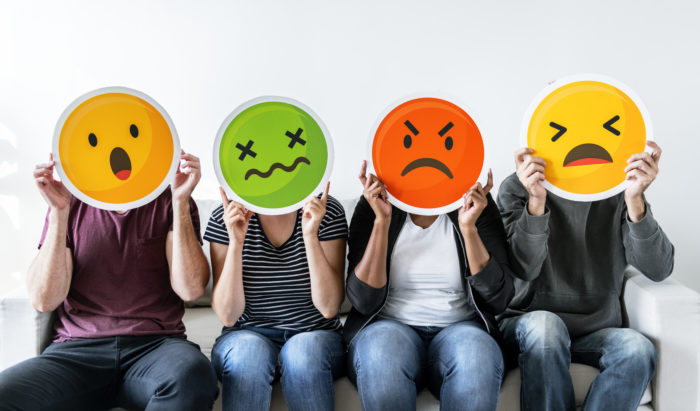Sappy, Sloppy Emotions: What’s the Point?

“Although many of us may think of ourselves as thinking creatures that feel, biologically we are feeling creatures that think.”
-Dr. Jill Bolte Taylor, Neuroscientist, and author of My Stroke of Insight
Stupid, sappy, mushy, melodramatic, insipid, tiresome, wimpy, lame. These are all words that I have heard people use to describe their own emotions.
As a psychologist, I see in our society a poor tolerance for something that is a deeply personal, biological part of who we are as humans: our emotions. Indeed, if you grew up in one of the many, many households where emotion was discouraged or poorly tolerated (Childhood Emotional Neglect), you may now, as an adult, have a negative connotation to feelings of all kinds. You may see emotion as a sign of weakness.
You may hide your feelings from yourself and others; even the people you care about the most. You may regard the expression or sharing of feelings as maudlin, illogical, or just plain useless. You may have no idea what you feel or why because you have buried your emotions so deeply, even from yourself.
Why did emotion evolve in the first place? Sometimes, especially to emotionally neglected people, emotions feel like a burden. Wouldn’t it be better if we didn’t have to feel sad when we had a conflict with a friend, angry when someone cuts us off in traffic, or anxious before a job interview? On the surface, maybe it would seem easier if we didn’t have to feel those things. But my belief is that if we didn’t have emotions, life would not be better. In fact, it would not be sustainable.
Emotion is necessary for survival. Emotions tell us when we are in danger. They tell us when to run, when to fight, and what is worth fighting for. Emotions are our body’s way of communicating with us and driving us to do things. Here are some examples of the purposes of just a few emotions.
9 Emotions and Their Specific Functions
| Emotion | Function |
| FEAR | tells us to escape/self-preservation |
| ANGER | pushes us to fight back/self-protection |
| LOVE | drives us to care for spouses, children, others |
| PASSION | drives us to procreate, create and invent |
| HURT | pushes us to correct a situation |
| SADNESS | tells us we are losing something important |
| COMPASSION | pushes us to help others |
| DISGUST | tells us to avoid something |
| CURIOSITY | drives us to explore and learn |
You get the idea. For every emotion, there is a purpose. Emotions are incredibly useful tools to help us adapt, survive and thrive. People who were emotionally neglected were trained to try to erase, deny, push underground, and in some cases, be ashamed of, this invaluable built-in feedback system. Because they are not listening to their emotions, they are operating at a disadvantage from the rest of us. Pushing away this vital source of information makes you vulnerable and potentially less productive. It also makes it harder to experience life to its fullest.
Emotions do more, though, than drive us to do things. They also feed the human connections that give life the depth and richness that makes it worthwhile. It is this depth and richness which I believe provides the best answer to the question, “What is the meaning of life?” Emotional connections to others help us stave off feelings of emptiness as well as existential angst.
You and Your Feelings
If you have spent a lifetime trying to deny your natural, biological emotional responses, you may at times feel disconnected, empty, or unfulfilled in life. The people who love you may find you distant, self-contained, or even arrogant. You may find yourself irritable or angry more often than you would like.
If any of this rings a bell to you, please read more about Emotional Neglect throughout this website. There is much more information about it in my book, Running on Empty: Overcome Your Childhood Emotional Neglect. In the book, I talk about the many forms that Emotional Neglect can take, the 12 types of parents who unwittingly emotionally neglect their child, and the 10 issues that emotionally neglected children struggle with as adults. I also offer six clear strategies for overcoming Emotional Neglect.
To learn more about Childhood Emotional Neglect, how it happens and how to recover from it, see my books Running Empty No More: Transform Your Relationships and Running On Empty: Overcome Your Childhood Emotional Neglect , and Take The Emotional Neglect Test for free.
